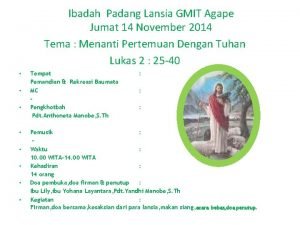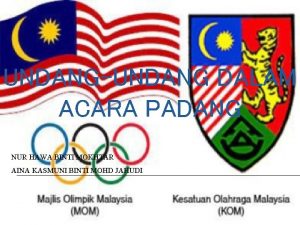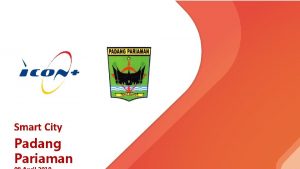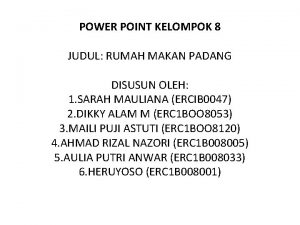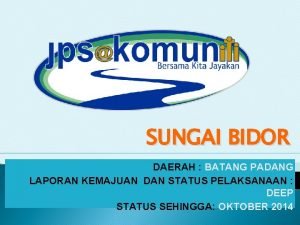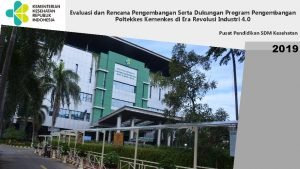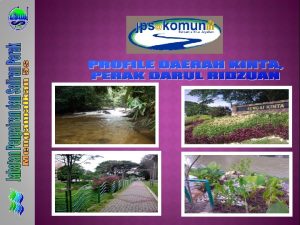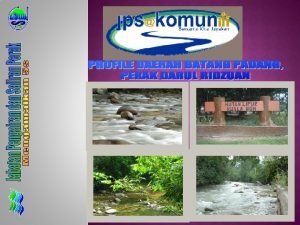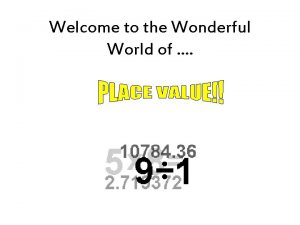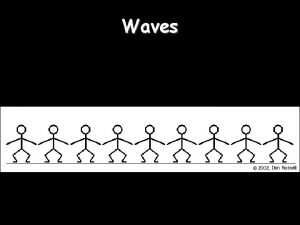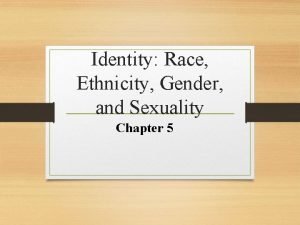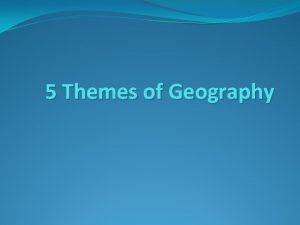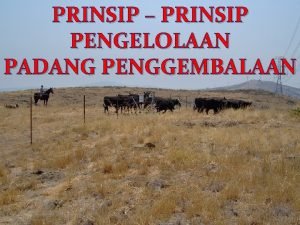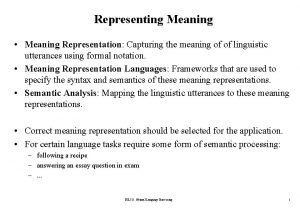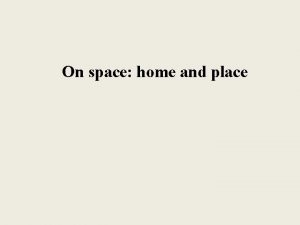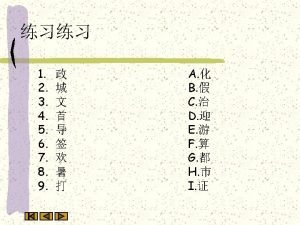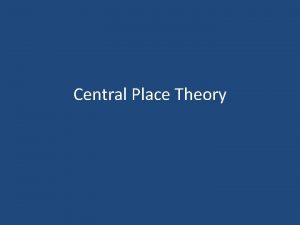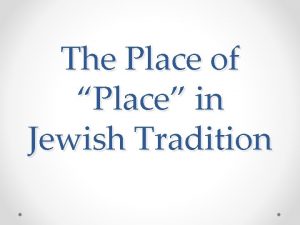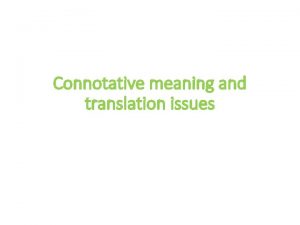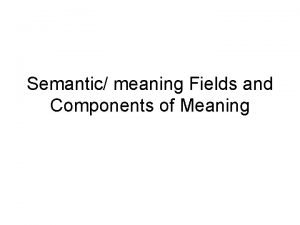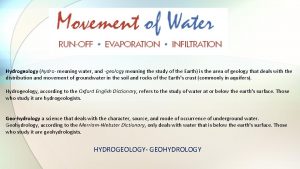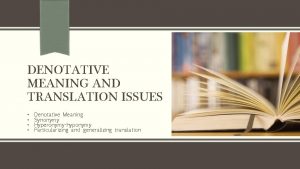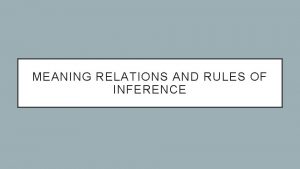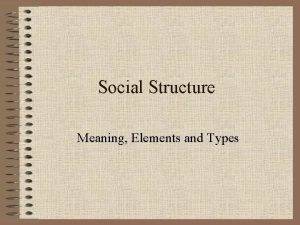PLACE MAKING AND MEANING OF PADANG AS A
























- Slides: 24

PLACE MAKING AND MEANING OF PADANG AS A PUBLIC PLACE IN HISTORIC CITIES OF MALAYSIA Nor Zalina Harun (PB 073042) Ph. D Candidate, Universiti Teknologi Malaysia

Introduction Physical PLACE Activities Meaning As suggested in previous research, ‘placebased’ study is one of the essential aspects of people-environment relationship and has important implications to the task of place creation which lies at the heart of architect, landscape architect and urban planner works. Based on past research, a tripartite components of place is proposed, that a place can never be understood without understanding its three interrelated components; 1) physical features, 2) activities, and 3) meaning. By considering this tripartite components in the context of public place, this research specifically underlines the essential roles and meanings of padang one of a cityscape components in historical city in Malaysia. In essence, this research was designed to determine the preservation of padang as people’s place.

Introduction: Public spaces are integral part of the built environment. The benefits and opportunities that urban public spaces can provide have been widely documented in literature. Among the benefits are: Environmental benefits (Jellicoe, 1975; Ward Thompson, 1990; Antrop, 2005; Scazzosi, 2007) Socio cultural benefits (Bentley et. al, 1985; Jacobs and Appleyard, 1987; Tibbalds, 1988; Gehl, 1996; Banerjee, 1998; Carmona et. al, 2003; Child, 2004; Carmona and Tiesdell, 2007) Economic benefits (Geoghegan, 2002; Moranche 2003)

The Padang q q Large turfed field with an area bigger than a football pitch. The development of padang begun as esplanade in British India and extended to South East Asia (Hoyt, 1993; Lim and Wong, 2000; Nordin, 2004). In the Malay town, padang played similar role as the royal courts or maidan. The padang often located in front of the mosque and sultan’s palace; the hub of the Malay society. The most common one was usually wide, turfed and surrounded by huge shady trees. The indigenous population considered this space as a central point and described the larger account as an open space of the field.

Research Background: In landscape architecture and urban planning, understanding of the contribution of public space to the city have been developed as early 20 th century. Broad changes and ultimate effect of mass development in the city centre started in 1960 s has extended greater respect into a research on the uniqueness of urban space, its history and continuity of local pattern and typologies. These processes show urban design studies evolved into a dominant platform for making place for people and the city. Besides place making, the research on urban public space has further drawn in other various disciplines including environmental psychology and environment and behaviour. The research seek to describe some aspect of human-environment relationship constituting sense of attachment that affect well being and quality of life. The interest centering around the study on public space has not stop here, in more recent years there has been a strong interest in reading and assessing public space which are of historical and cultural significance. This approach stressed the need for a more democratic and enriching environment in which all parties involved in urban development are urged to have the humility to learn from the past by respecting the place history, culture and surrounding context. The study identified preservation as fundamental for maintaining and nurturing social identity.

Research Gap But amid the resurgence of interest in such researches, literature review indicates that: 1. Very little, attempts at bringing public space contribution to the identity of place and people. Attention was often concentrated on single or dual component of place (physical and activities) with not much is done to integrate whole components (physical+activities+meaning) ; the interdisciplinary nature between urban design and environmental psychology. 2. Although research on both disciplines is recorded in the western countries, it is still minimal in developing countries including Malaysia. 3. Lack of theoretical discussion on the process of place meaning beyond the widely acknowledged three levels of meaning; low, moderate and high levels. 4. The roles of place attachment as a component that give place meanings has not been adequately explored. 5. Even though place literature suggests that place attachment may imply a deep concern about place however there is not much is known about how changes on favorite places affects or disrupts people.

Issues on public space: Global Concern q q q In a global perspective the general condition of public space in many cities are usually assigned with low priority and is far from satisfying. The rising movement on demand for space for new industrial and associated commercial uses has become the generator for such large uncontrolled structures development. Conflicting desires between public as the users of public space and developer as the agent of change in urban area have been prolonged since 1960 s. Despite of such fight, streets, squares, parks and natural features were continuously succumbed to new development. An appearance of placelessness, inauthentic physical environment, anonymous, repetitive urban fabric, polarized social environment and pseudo place has become a representative of urban spaces in many developing countries and developed cities are among the results of this movement.

Issues on public space: Local Concern q q The overzealous effort to promote urban heritage has been exploited over aspiring sensation for tourist attraction. Visualisation of urban histories in highly aesthetic way yet narrowly conceived have become the concept of many new development in historical cities in Malaysia. These have led to a major effect on the loss of traditional urban form, localised identity, diversity, coherence and identity. Urban conservation effort is still unable to deal with less tangible physical properties of the historic urban areas including public spaces, natural environment and people’s activities within the old city centre. Consequently, all features that give a city its unique character are continuously disappeared. The pressure for development and inability to preserve urban heritage has taken its toll on the sustenance of public spaces in many historical cities (i. e Bukit Nanas, Bukit Aman, Stadium Merdeka) The problem was made worse by the failure in appreciating and maintaining of padang, which is of historical and cultural significances in many Malaysian cities. Being an open space in the core area of many historical cities nevertheless has made it a desirable space for tourism, commercial and structural development.

Research underpinning Place making: The process of making good place by reviewing substantive dimension in urban design such as urban design, social, visual and functional (Carr et al. , 1992; Tibbalds, 1992; Carmona, 2003; Carmona and Tiesdell, 2007). Place meaning: A key to the importance of place subjected to knowledge and experience people have within it (Relph, 1976; Green, 1999; Gustafson, 2001; Manzo, 2005). Place attachment: Affective bond or link between people with particular setting (Low and Altman, 1992; Hidalgo and Hernandez, 2001; Walker and Ryan, 2008).

Aim of Research To justify the validity and maximise the value of padang in historic city, research is needed that may inform practitioners and decision-makers its various benefits and meanings: To determine the significance of padang as a public space which contributes to the evocation of place making and meaning in Malaysian historical urban area.

RESEARCH OBJECTIVES 1. 2. 3. 4. To explore the role played by padang as public place in a city scape; To investigate the evolution of padang in historic city; To recognize meanings amongst residents suggesting their place attachment for padang as a public place; and To distinguish meaning of padang with residents whose padang had been replaced with a new place.

Research Questions RESEARCH ASSUMPTION: Being located in the heart of city centre and act as a platform for the residents to conduct social and cultural activities, have signifying the role and function of the long existed padang in historic city. The change of it physical layout and the loss of padang may significantly affects the life and feeling of the residents. KEY RESEARCH QUESTION SUB-RESEARCH QUESTION PART 1: URBAN DESIGN 1. Why padang in historic city is significant and deserve for preservation? 2. How does padang play its role in contributing to the formation of good city image? What is the current condition of padang in historic cities in Malaysia? PART 2: PERCEPTUAL ASPECT 3. 4. 5. What are the meanings of padang to residents? How do residents interact with the padang result to place attachment? How does the loss of padang as a public place affected the residents?

Research Parameters of the study are classified into six determinants that are subordinated into parameters and dimensions as follows: Determinants 1. Evolution of padang 2. Properties and attributes a) a) b) c) d) Parameters Development and change Landscape and environmental properties Architectural properties Social and cultural properties Accessibility Dimensions Spatial layout and configuration of streets, buildings, open spaces, the building fabric, and the pattern of land building utilisation Urban landscape character. The relationship between form and function Openness/Greeneries/Huge old trees Scenic views Historical buildings and landscape amenities Its historical values/Its name/Games and sports held on padang/Special events and ceremonies/Cultural events/Annual events/Togetherness/Music played on padang (traditional song, music band)/ religious ceremony Strategically located/Easily access/The environment is to read, understand remember/Can cater large crowd with many activities 3. Experiential Contacts 4. Perceptual response a) b) Opportunities at padang Visits Meaning of padang Sense of place attachment Use; Activities Frequency Denotative meaning/connotative meaning/abstract meaning Place familiarity/place dependence/ place belonginess/place identity/ place rootedness 5. Psychological effects a) b) Factors of placelessness Effects from placelessness Change and discontinuity Place disruption Gender Ethnicity Age group Residency Years of residence Distant from residence to padang Occupation Male/Female Malay/Chinese/Indian/Others Young adult (18 -21 yrs old)/Adult (22 -55 yrs)/Elderly (55 years and above) Native/ non-native 1 -10 years/11 -30 years/31 -50 years/50 -70 years Less than 1 km/ 1 -10 km/11 -20 km/21 -30 km/31 -40 km/> 40 km 6. Characteristics a) of Residents b) c) d) e) f) g) Student/Housewife/Self employed/Clerical/supervisory/Executive/ Professional/Retired/Others

The Study Site To further establish the significance of padang in historical city, a comparison of roles and meanings between padang which still remain in the city and padang which had loss most of its original character were mapped out. The research argues that since the development and planning took place in both cities are different in maintaining their original urban spatial characteristics, different spatial impact might be shown. Moreover, comparing the meanings elicited by residents from both sites may imply different prioritisation which could strengthen the requirements of upholding padang as urban component and heritage as to avoid more changes and similar type of demolition occurs. 1. Padang Kota Lama, Georgetown This research is exploratory and semiotic in nature applying a mixed method with five phases of data collection preceded by a pilot study. 2. Dataran Pahlawan formerly known as Padang Pahlawan, Bandar Melaka

Research Methods Research objectives 1. To explore the role played by padang as public place in a city scape 2. To investigate the evolution of padang in historic city Strategies of inquiry Historical review : Historical review on archival document analysis (old maps, old photographs, literature resources) Morphological study : Detail analysis of site plan: streets, buildings, open spaces, (the building fabric, and the pattern of land building utilisation) Field observation : Analysis of urban landscape character. The relationship between form and function had become the integral part of the method of the study. Identification of components: districts, paths, nodes, edges and landmarks. Townscape elements appraisal

Research Methods Research objectives Strategies of inquiry 3. To recognize meanings amongst Questionnaire survey: residents suggesting their place Public intercept attachment for padang as a public place Door to door ( PKL n= 209 , PP n= 165) 4. To distinguish meaning of padang with residents whose padang had been Semi structured interview: replaced with a new place. Face-to- face ( PKL n= 30 , PP n= 40)

Results Dimension Place meaning PKL N=30 PP N=40 Diversity A place for relaxing A social place A place for trading 24 A cultural place A place for hawking A place for recreation 24 Distinctiveness A historic place Spacious A beautiful place 18 A place for important events A historic place A place for interpersonal relationship 38 Valuation A good place A must destination Important place 9 Best place in town A unique place Enjoyable place 34 Symbolic A place that bring back childhood memories It is part of the town 9 A place called home It was the soul of the country 6

Research Findings 1. Padang and it surrounding area convey various roles and architectural meanings. 2. The distinctiveness and diversity of padang’s properties and attributes makes it a special place in a city. 3. Series of fortunate and unique events has led to the success of padang as public place of historical cities in Malaysia. As a result, people place a proliferation of meanings towards padang suggesting their strong sense of place attachment. 4. The changes and the loss of padang as a memorable public place has weaken place identity and affecting the people who live in the area. The study also shows that the disturbance of one urban component in some way affecting all others. 5. The meaning of a place is changed due to three main attributes identified as change of physical character, discontinuity of experiences and insecurity. The study demonstrate how such attributes had badly affected resident’s positive feelings and perceptions toward padang and its surrounding area.

Theoretical Implications: Place meaning process and relationship to place attachment 1. 2. 3. The findings from this study show that there are three levels of meanings constructed by residents on padang as a public space; denotative (low), connotative (medium) and abstract (high). The study has revealed four dimensions identified as distinctiveness, diversity, and valuation and symbolic as significant in mapping meaning of place. These meanings encompassed of five repeatedly mentioned constituents namely the physical properties, culture, history, activities as well as communal and personal interactions. Each of the meaning explicated has distinct characteristic that make it salient in comparison to the others. This finding suggests that place meaning is not easily analysed in formal and conceptual terms. Viewing the findings in light of the connection between meaning and place attachment, this study subsequently shows that different type of attachment was conceptualised in different level of meanings; denotative=cognitive attachment , connotative=affective attachment and abstract=symbolic attachment.

Theoretical Implication Denotative meaning Connotative meaning Abstract meaning Distinctiveness + Valuation Symbolical / analogical Place belongingness Place identity Place rootedness Place identity Diversity Place familiarity Place dependence Cognitive attachment + Affective attachment Symbolic attachment

Theoretical Implication: Place disruption process There are three main stages identified in the emotional process that the residents have gone through in dealing with the changes and demolition of Padang Pahlawan. The process can be chronologically observed starting from pre-demolition, followed by demolition itself and ending with post-demolition. EMOTIONAL VOTALITY PRE-DEMOLITION POST-DEMOLITION Anger Demolition announcement On the process Acceptance Bargaining Testing Shock Denial Depression PLACE DISRUPTION PROCESS Rejection

Urban Design Implications 1. Encourage preservation of structural and natural properties in padang 2. Encourage rehabilitation of the landscape and natural properties in urban area 3. Encourage preservation of social and cultural attributes in padang area 4. Recommendation and promotion of public participation to protect public interests in public place

Research Significances The findings of this study is hoped to develop a survey technique that lays the groundwork for an assessment tool that local authorities can use under their supervision that could assist them to determine the value of public space in historical city. Understand that the intimate relationship between place, histories and social interactions is critical to successful design and planning in any historical urban context. Understanding people’s perception of place is important in planning for adaptable places because the adjustment of their expectations is a key to their satisfaction with urban change. This study could provide a useful professional tool to give a voice to communities in response to such concerns. Better understanding of the above underpinnings would be useful to guide conservation, enhancement or creation of features that are perceived to be compatible with local character whilst minimizing those features perceived to be out of character.

THANK YOU
 Gl hrmis
Gl hrmis Kalau singa?
Kalau singa? Berapakah keluasan padang hoki?
Berapakah keluasan padang hoki? Khotbah khusus untuk lansia
Khotbah khusus untuk lansia Berat cakera lelaki bawah 15 tahun
Berat cakera lelaki bawah 15 tahun Icon plus padang
Icon plus padang Struktur organisasi rumah makan padang
Struktur organisasi rumah makan padang Peta daerah batang padang
Peta daerah batang padang Sd dian andalas padang
Sd dian andalas padang Peralatan di stor sukan
Peralatan di stor sukan Vilep padang
Vilep padang Daerah hulu perak
Daerah hulu perak Jps kinta
Jps kinta Place place value and period
Place place value and period War making and state making as organized crime
War making and state making as organized crime A disturbance that transfers energy
A disturbance that transfers energy A disturbance that transfers energy
A disturbance that transfers energy Making inferences
Making inferences What is invictus
What is invictus Geographic scale ap human geography
Geographic scale ap human geography Sense of place meaning
Sense of place meaning Place 5 themes of geography definition
Place 5 themes of geography definition Adverb of place sentence
Adverb of place sentence Image making meaning
Image making meaning Major decision definition
Major decision definition



